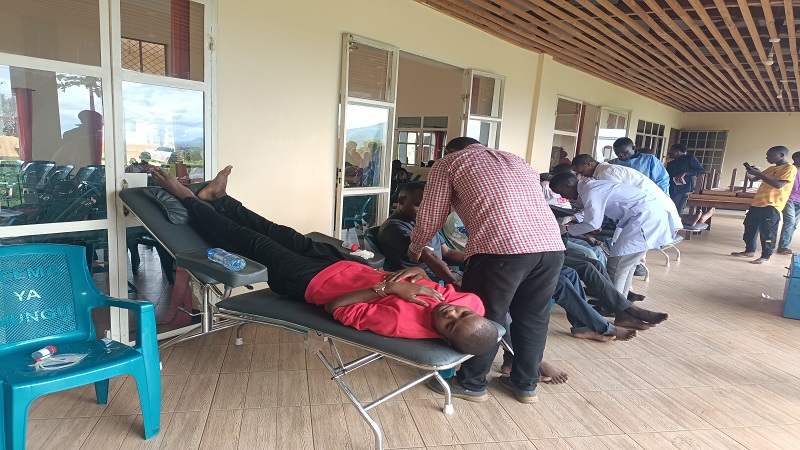Investing in youth is key to regional growth and food security

The agri-food systems value chain forms the economic bedrock of the East African Community (EAC) Partner States, providing livelihoods and fueling regional progress. However, to fully realize its potential and achieve lasting food security, the sector must actively engage and empower its most dynamic resource: the youth.
Organizations like the Alliance for a Green Revolution in Africa (AGRA) have long underscored the critical role of robust policy frameworks and strong state capacities in driving agricultural transformation. This aligns seamlessly with the EAC’s Vision 2050, which prioritizes boosting the agriculture value chain through the active participation of youth, who constitute, on average, over 74% of the population across the region, encompassing both young men and women.
A central focus of both AGRA’s initiatives and the EAC’s Vision 2050 is ensuring that these policies are inclusive, particularly for the burgeoning youth population eager to participate in the agri-food system.
To advance this crucial agenda, the EAC recently convened a significant dialogue centered on the outcomes of the Regional Joint Agricultural Sector Review (JSR), with a specific emphasis on the involvement of youth in agri-food systems. The review provided invaluable insights into the current state of agricultural policy implementation across the region and the extent to which youth and women are integrated.
While acknowledging the existence of relevant policy frameworks, a key finding of the JSR revealed a significant disconnect: the majority of Partner States' policies on gender and youth are not adequately aligned with the objectives of the Regional Agricultural Investment Plan (RAIP).
This misalignment presents a serious challenge. RAIP, which aims to advance the Comprehensive Africa Agriculture Development Programme (CAADP) goals, including regional food supply, utilization, and value addition, cannot achieve its objectives without the full integration of youth. As Partner States move towards implementing and domesticating regional policies, ensuring alignment with national frameworks will be paramount.
Available demographic data underscores the urgency of this integration. Surveys indicate that youth (ages 15–35) comprise a substantial portion of the EAC population. For example, the UN estimates the median age in the region to be approximately 18, highlighting a predominantly young demographic. However, youth unemployment remains alarmingly high, ranging between 51% and 57%.
Harnessing the energy, innovation, and digital fluency of this demographic within agri-food value chains holds transformative potential. These young individuals are not merely farmers; they are agripreneurs, pioneering novel business models, technologies, and services. Yet, their endeavors often encounter an unsupportive policy environment. The Youth in Agribusiness report highlights that many young people are already active in diverse areas such as seed production, input supply, processing, mechanization, marketing, urban farming, and circular economy initiatives.
The JSR Policy Review identifies broader impediments, including insufficient funding for policy implementation and delays in enacting the necessary regulations to support youth engagement in the food systems value chain.
These obstacles, such as limited access to land and skills, disproportionately affect youth, particularly those lacking capital or navigating complex bureaucratic procedures. Furthermore, the limited policy emphasis on youth empowerment hinders sector growth and job creation both on and off the farm.
To fully capitalize on the demographic dividend and cultivate a vibrant agricultural future, the EAC must adopt a targeted and impactful policy shift. This entails:
- Strengthening implementation of regional agricultural policies and strategies by prioritizing youth inclusion and explicitly integrating their perspectives and addressing their unique needs. The EAC Youth Policy should clearly align with agricultural development and the African Union’s Africa Agribusiness Youth Strategy (AAYS).
- Enhancing regional flagship programs for youth in agribusiness. This requires moving beyond general support and offering tailored solutions such as access to finance, land, skills training, mentorship, and market linkages.
- Improving data collection and management by establishing a regional database to track youth engagement in agriculture, identify gaps, and better target support.
- Streamlining regulatory processes and supporting timely policy domestication: Ensuring effective youth participation in policy platforms at both regional and national levels. As the JSR review results underscore, delays in enacting regulations create uncertainty and limit youth engagement.
- Continuously promoting Public-Private Partnerships (PPPs): Ensuring sustainable financing and management of agro-industrial parks and value chains, with youth-specific provisions to drive business development and job creation.
- Strengthening youth engagement platforms: Amplifying youth voices in regional coordination and dialogue. Young agripreneurs must have a seat at the table in shaping the future of agriculture.
The CAADP Strategy and Action Plan and the CAADP Kampala Declaration, adopted by AU Heads of State and Government in Kampala, Uganda, present a powerful opportunity to act on the aforementioned recommendations. If implemented effectively and actions are brought closer to communities, rather than remaining on paper, this declaration can drive real change. It commits to empowering at least 30 percent of youth to participate meaningfully in agri-food value chains by 2035, through improved access to finance, innovation, technology, and land, especially for women, youth, and vulnerable groups.
In conclusion, the JSR Policy Review provides a crucial baseline for action. By addressing gaps in youth inclusion and resolving broader implementation challenges, the EAC can cultivate a thriving policy environment that empowers youth to spearhead agri-food transformation. The energy and innovation are already present; it is now incumbent upon policymakers to cultivate
Boaz Keizire (L) is the Director, Policy & State Capability at AGRA and Jean Baptiste Havugimana (R ) is the Director Productive Sectors (DPS), East African Community Secretariat)
Top Headlines
© 2025 IPPMEDIA.COM. ALL RIGHTS RESERVED

























